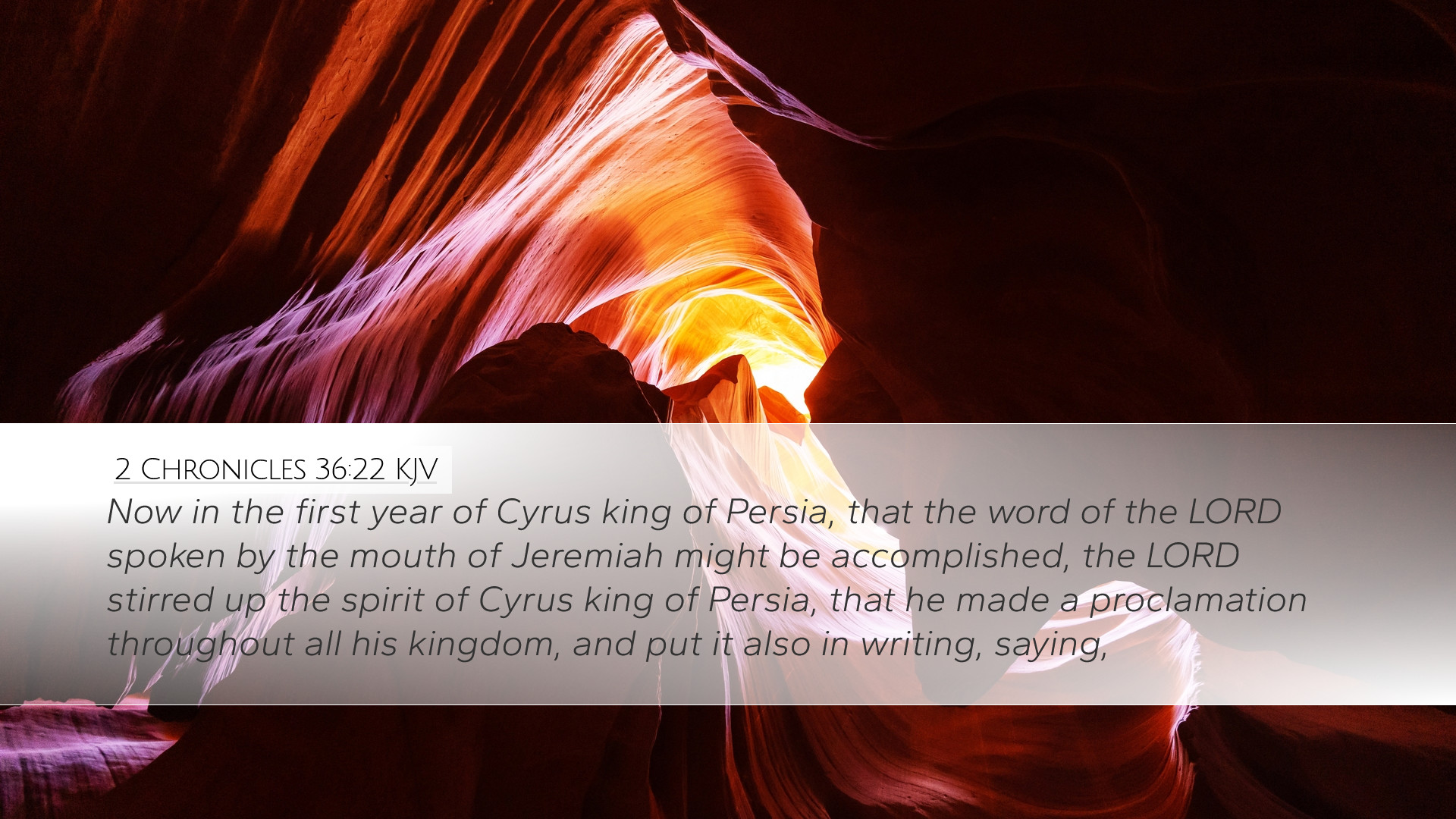Commentary on 2 Chronicles 36:22
Verse Context: 2 Chronicles 36:22 states, "Now in the first year of Cyrus king of Persia, that the word of the LORD spoken by the mouth of Jeremiah might be accomplished, the LORD stirred up the spirit of Cyrus king of Persia, that he made a proclamation throughout all his kingdom, and put it also in writing, saying," This marks a pivotal moment in the history of Israel, as it emphasizes the fulfillment of prophecy and the divine orchestration behind historical events.
Historical Background
The historical backdrop of 2 Chronicles 36 involves the Babylonian exile and the subsequent rise of Cyrus the Great, who conquered Babylon in 539 B.C. This event was vital for the Jewish people, who had spent seventy years in exile. The mention of Cyrus in this verse not only highlights the shifting powers of the ancient Near East but also serves to illustrate God's sovereignty over history.
Theological Implications
The verse encapsulates several theological themes:
- God's Sovereignty: The stirring of Cyrus's spirit signifies God's control over earthly kings and kingdoms. God is not a passive observer but actively works through leaders to accomplish His divine purposes.
- Fulfillment of Prophecy: This verse serves as a fulfillment of Jeremiah's prophecy concerning the return of the Jewish people to Jerusalem after the exile (Jeremiah 29:10). It reinforces the idea that God's promises are faithful and will come to pass.
- The Role of Kings: Cyrus, although a pagan king, is used by God to facilitate the restoration of His people. This demonstrates that God can use anyone, regardless of their faith, to achieve His plans.
Commentaries Insights
Matthew Henry:
Matthew Henry, in his comprehensive commentary, emphasizes the importance of divine providence illustrated in this verse. He explains that God can inspire even the hearts of secular leaders to fulfill his purposes. Henry notes that Cyrus's edict reflects God's grace towards Israel, as He not only returns them from exile but also allows them to rebuild their temple.
Albert Barnes:
Albert Barnes details how this passage serves to showcase the transition in the fortunes of the Jewish people. He points out that Cyrus was an instrument of Providence, acting in ways he may not have fully understood. Barnes asserts the importance of seeing God's hand in the midst of human history, reinforcing that the Lord can turn the hearts of kings at His will.
Adam Clarke:
Adam Clarke provides insightful reflections on the character of Cyrus, praising him as a just and honorable ruler. Clarke elaborates on how God worked on Cyrus's heart, not only leading to the liberation of the Jews but also prompting him to issue a decree that acknowledges the God of Israel. He emphasizes that Cyrus's actions were instrumental in bringing about a critical shift for the Jewish nation. Clarke also notes the emotional resonance for the returning exiles, who saw the fulfillment of God's promise as a restoration of hope and identity.
Practical Applications
For pastors and spiritual leaders, this passage serves as a reminder that God's purposes will prevail, even amid difficult circumstances. Here are practical applications derived from this commentary:
- Encouragement in Trials: Just as the Israelites were comforted by the return from exile, believers today can find encouragement knowing that God is sovereign and actively working in their lives.
- Faith in God's Promises: The fulfillment of Jeremiah's prophecy challenges believers to trust in God's promises, fostering a faith that extends beyond immediate circumstances.
- Sensitivity to God's Leading: Like Cyrus, individuals are encouraged to remain open to God’s direction in their lives, understanding that He can use them for His purposes regardless of their background or status.
Conclusion
2 Chronicles 36:22 is a powerful reminder of God's unwavering faithfulness and providential care. The work of Cyrus not only signifies a change in the temporal situation of Israel but also affirms the trustworthiness of God’s promises over time. As pastors, students, and scholars reflect on this verse, may they be inspired to see beyond the surface of human affairs and recognize the hand of God orchestrating history for the good of His people.


